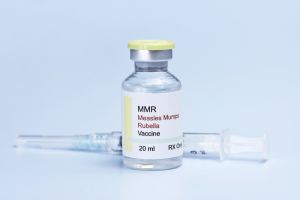A mumps infection only lasts for a couple of weeks, but the effects can be lifelong–especially for your hearing. The viral infection has been on the rise lately with the reported number of cases increasing from slightly more than 1,000 in 2015 to more than 6,000 in 2016 and 2017. A January 2019 outbreak in the U.S. Northwest prompted public health officials to urge parents to vaccinate their children as they scrambled to contain the highly contagious viral illness.
What are mumps?

mumps and rubella. All three infections
can cause hearing loss as a possible
complication.
Mumps, which got its name from an Old English word meaning “grimace,” belongs to the same family of viruses known to cause measles and several common respiratory infections.
It spreads easily from person to person through infected saliva, typically when a person coughs or sneezes. It generally takes about two weeks for a person to become sick after being exposed.
What are the symptoms of mumps?
Mumps is perhaps best known for causing painful swelling of the salivary glands on one or both sides of the face. Other symptoms include:
- Pain while chewing or swallowing
- Fever
- Headache
- Muscle aches
- Weakness and fatigue
- Loss of appetite
- There can also be no symptoms–yet still cause complications later on
Are there complications?
Yes. Besides hearing loss, mumps can cause inflammation and swelling in other parts of the body, including the testicles, pancreas, ovaries and breasts, brain (encephalitis), and membranes and fluid around the brain and spinal cord (meningitis).
Fortunately, most of these complications are rare.
How does mumps cause hearing loss?
We still don’t know exactly how mumps causes damage to hearing. Some experts think it may damage the cochlea, the snail-shaped structure in your ear that house stereocilia and the stria vascularis. Stereocilia, otherwise known as hair cells, translate sound vibrations into nerve impulses for the brain to interpret as sound. The stria vascularis supplies blood to the inner ear. Other potential sites of damage are the auditory nerve or brainstem regions.
Those who lose hearing as a result of mumps most likely have sensorineural hearing loss. The hearing loss is almost always in one ear–known as unilateral hearing loss or single-sided deafness. Typically the loss is reversible but it may be severe and permanent, meaning a child loses most of their hearing in one ear.
Measles and rubella also can cause sensorineural hearing loss. Although normal hearing cannot be restored, there are several options that can improve hearing and communication:
- Hearing aids may be beneficial for those who suffer mild-to-moderate hearing loss. A hearing healthcare professional can help you decide which hearing aid manufacturer and model is best for your budget and your lifestyle.
- Bone-anchored hearing devices may be a good treatment option for those with single-sided deafness. This surgically implanted device translates sounds into vibrations of the skull, which are picked up by the normally hearing ear.
- Cochlear implants are an option for those with profound hearing loss. The device transmits sounds to a surgically implanted electrode array that bypasses the damaged cochlea and directly stimulates the auditory nerve.
- American Sign Language (ASL) is a rich, vibrant language with its own syntax and grammar which uses hand gestures, body language and facial expressions.
- Cued speech is a type of sign language which uses hand movements combined with mouth shapes.
Fortunately, mumps-related hearing loss is uncommon. Research indicates that about 1-4% of people who get infected with mumps experience hearing loss, though the exact rate is unknown.
Can mumps be prevented?
Your best defense against the disease is immunization. Talk to your pediatrician about vaccination schedules for your children as well as adult members of your family who have not yet had the mumps and haven’t been vaccinated—or need a booster shot.
Mumps is known as a childhood disease so parents are advised to immunize their children against the disease at 12-15 months, with a booster at 4-6 years of age, and another booster again in the teen years.
The vaccine is generally given three times—right around a child’s first birthday, again at kindergarten age, and finally in high school or college. That final booster is important: Evidence shows that people who have had two or fewer mumps vaccines are more at risk than those who have had all three.
The mumps vaccine is commonly administered together with measles and rubella and is known as the MMR vaccine, or MMRV if varicella (chicken pox) is included. Medical professionals believe this vaccine provides about 80 percent long-term immunity against the diseases, yet outbreaks still occur—mostly due to lack of vaccination.
Adults born before 1957 who haven’t yet contracted mumps should consult their family doctor about receiving an immunization, especially if they work in a high-risk environment, such as a hospital or school, or near a current mumps outbreak.
If you do suspect hearing loss
In the rare event you or a member of your family experience hearing loss after mumps, schedule an appointment with a hearing healthcare professional as soon as possible. Ask your family physician for a referral or search for a qualified hearing professional in your community from our Find a Clinic section.
